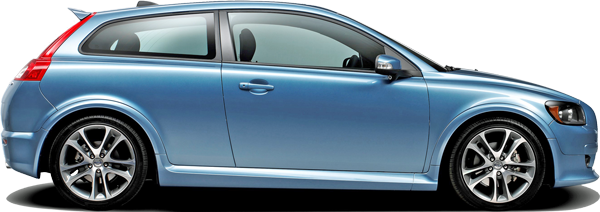The Comparative Analysis :
Volvo C30 D5 (08 - 09) vs. Volvo C30 2.0F (Ethanol) (09 - 12)
€ 26,300

€ 22,100

€ 26,300
Base Price ⓘBase price of a new vehicle with standard equipment in Germany at market launch.
€ 22,100
ⓘBase price of a new vehicle with standard equipment in Germany at market launch. Price Info
Vehicle Dimensions
Тhere is barely any difference in dimensions between the two vehicles. Both cars are the same width and height, but the C30 D5 is 1.4 cm shorter.
C30 D5
C30 2.0F
1447
1782
2039
1447
1782
2039
1782 mm
Width
1782 mm
2039 mm
Width Incl. Mirrors
2039 mm
1447 mm
Height
1447 mm
2640
4252
2640
4266
4252 mm
Length
4266 mm
2640 mm
Wheelbase
2640 mm
Vehicle Weight
C30 D5
C30 2.0F
1465 kg
Kerb Weight
1409 kg
1900 kg
Gross Vehicle
Weight
Weight
1750 kg

Weight Difference:
56 kg
3.82 %

General
C30 D5
C30 2.0F
M
Generation
M
Hatchback
Car Body Style
Hatchback
Diesel
Fuel Type
Ethanol

Front-wheel drive
Drive
Front-wheel drive

6-speed manual transmission
Transmission
5-speed manual transmission
Engine
C30 D5
C30 2.0F
Straight-five diesel engine with two turbochargers (biturbo)
Engine Type
Straight-four petrol engine (naturally aspirated engine)
D5244T8
Engine Code
B4204S4
4
Valves
4
5
Cylinders
4
2400 CC
Engine Capacity
1999 CC
178 bhp
at 4000 rpm
Power
143 bhp
at 6000 rpm
C30 D5
178 bhp
143 bhp
C30 2.0F
400 NM
at 2000 rpm
Max. Torque
185 NM
at 4500 rpm
C30 D5
400 NM
185 NM
C30 2.0F
Performance
C30 D5
C30 2.0F
140 mph
Maximum Speed
130 mph
7.7 sec
Acceleration 0 to 62 mph
9.4 sec
62 mph
62
mph
mph
107 m
0.000 sec

C30 D5
62 mph
62
mph
mph
131 m
0.000 sec

C30 2.0F
▶ REPLAY
8.23 kg/bhp
Weight-to-Power Ratio
9.85 kg/bhp
C30 D5
8.23 kg/bhp
9.85 kg/bhp
C30 2.0F
Fuel Economy / Emissions
C30 D5
C30 2.0F
Fuel Economy
46 mpg
combined
28 mpg
C30 D5
46 mpg
28 mpg
C30 2.0F
34 mpg
city
20 mpg
56 mpg
motorway
37 mpg
60 L
Fuel Tank Capacity
55 L
601 mi
Range
339 mi
C30 D5
601 mi
339 mi
C30 2.0F
Environmental Impact
127.6 kWh
Total Energy Consumption
per 100 miles ⓘThe total energy consumption per 100 miles is the amount of energy consumed by a vehicle when burning fuel or using electricity per 100 miles (final energy), and the energy required to produce the appropriate amount of fuel or electricity (primary energy).
per 100 miles ⓘThe total energy consumption per 100 miles is the amount of energy consumed by a vehicle when burning fuel or using electricity per 100 miles (final energy), and the energy required to produce the appropriate amount of fuel or electricity (primary energy).
319.9 kWh
C30 D5
127.6 kWh
319.9 kWh
C30 2.0F
Euro 4
Emission Standard
Euro 4 / Euro 5
164 g/km (NEFZ)
CO2 Emissions
180 g/km (NEFZ)
Practical Convenience
C30 D5
C30 2.0F
3
Doors
3
4
No. of Seats
4
435 kg
Maximum Payload
341 kg
278 L
Boot Capacity
278 L






921 L
Boot Capacity (Seats Down)
921 L












